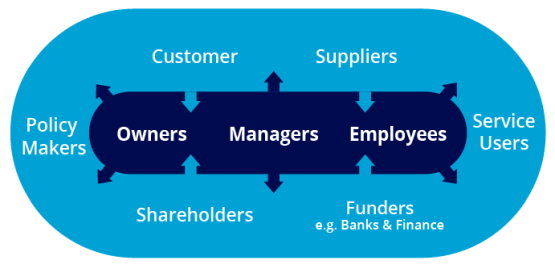
At the start of any project, it is essential to gain a comprehensive understanding of our client’s business challenges and research objectives. One way to immerse ourselves in our client’s business is by conducting internal interviews at the beginning of a research project.
These interviews along with the formal kick off meeting, form the initial phase of a research project where our goal is to gather as much insight as possible about our client’s business and research needs. Investing time into this initial stage ensures we set the project up for success.
What are internal stakeholder interviews?
Internal stakeholder interviews are one-to-one conversations with stakeholders from our client’s business. These stakeholders might include people who couldn’t join the kickoff meeting, senior leaders who need to be fully invested in the project, or subject matter experts who can share their valuable knowledge with us.
The number of internal interviews conducted varies by project and depends on the number of stakeholders our client thinks it would be beneficial for us to speak to. We have conducted projects with anywhere between 3 and 25 internal interviews.
When might we want to use stakeholder interviews?
When the business has a complex set up, or wide stakeholder network
Carrying out stakeholder interviews can be useful when we want to hear from a wide variety of stakeholders in the business, who are not part of the day-to-day project team. We might want to use them in this instance, if:
- There are lots of departments that our client wants to involve in the research
- There are multiple regions that our client wants to involve in the research
Typically, we would speak to a department head in this instance, or someone who is relatively senior.
When the research is covering niche objectives
It can be useful to have a discussion with ‘experts’ within our client’s organization if the research we are carrying out has very niche objectives or topic areas. For example, if we want to explore sustainability in detail, then we might want to carry out a stakeholder interview with the organization’s sustainability expert in order to have a better understanding of the topic area.
When the business holds lots of internal research, or anecdotal knowledge
In the immersion stage, we want to understand what research has been previously conducted, as well as internal assumptions or hypotheses. Stakeholder interviews can help us to collect stakeholder knowledge and assess the research that has already been conducted.
Potential topics for internal stakeholder interviews
Conversations can be tailored to each interviewee. Topics we often cover include:
-
The individual’s expertise, whether that be market, product, customer or value chain expertise.
-
The intended use of the research. What an individual will do with the insights and how we can ensure the projects success for them.
-
Existing hypotheses and critical questions they need answers to.
5 key benefits of internal stakeholder interviews
-
Deepening knowledge of our client
Internal interviews are an excellent way to understand what is already known within the organization. This avoids duplicating existing insights and allows us to focus on uncovering new information. Internal interviews are also a great way to identify any blind spots within the company, enabling us to focus our research on what really matters.
Internal interviews also help us to immerse ourselves in the business, providing a clear understanding of our client’s goals and objectives and the wider market or category.
-
Learning technical information
Often in B2B markets, products and services are technical, and each client will use different terminology relevant to their organization. Stakeholder interviews allow us to probe and fully understand any technical information. There are two major advantages of doing so:
-
We know which technical terms to use in our questionnaire – and notably, how these differ by region or department. This way, we can know for sure that we are reporting the most accurate responses!
-
The research team is fully versed in any technical lingo, which is particularly beneficial when presenting back to technical teams
-
-
Uncovering new avenues to explore in the research
Often, when we carry out stakeholder interviews, we will highlight questions which had not been considered previously. This is particularly useful when we are carrying out a multi-method research project including desk research, as it can give us more steer on what we need to uncover.
Stakeholder interviews can act as an effective check-and-balance on other research sources that we are using – meaning that we can triangulate our findings with stakeholder knowledge, desk research and primary research.
-
Identifies gaps in perception
During stakeholder interviews, we can explore internally-held hypotheses, which we can look to evidence or refute using our empirical research. Understanding the gap between internal perceptions and market-based evidence can help bring reports to life and make for interesting discussion points when presenting back the findings.
Furthermore, it allows the research team to understand any points of contention which should be treated with care when creating our reports.
-
Increased buy-in and support leading to action
The likelihood of research results being implemented depends on how invested key stakeholders are. Involving different stakeholders in the internal interviews allows them to share their perspectives and raise any questions, increasing buy-in and connection to the results.
Engaging internal stakeholders brings us closer to our client’s team, building a collaborative partnership where we act not just as a research supplier, but as an extension of their business.
3 tips for ensuring successful internal stakeholder interviews
-
Include subject matter experts: Select stakeholders who can provide specific insights on the research topic.
-
Include stakeholders who will be using the insights: Gather opinions from those who will use the insights to ensure the research leads to actionable results.
-
Introduce the research before the interview: Explain the purpose of the research project and the conversation. This ensures everyone is aligned on the research scope and interview expectations. This prevents any misalignment and reduces the risk of stakeholders diverting the research from its core objectives.
Internal stakeholder research in practice: How we used internal interviews for our client
The aim of the research was to create a companywide segmentation of our client’s customers. To kick off the project, we wanted to get an in depth understanding of how different stakeholders were currently segmenting customers and how they were using these segmentations. We wanted to ensure our segmentation would be practical and actionable for those needing to use it. To achieve this, we conducted 20 internal interviews with various stakeholders. These interviews were tailored to each participant but all covered topics such as:
- How they intended to use the segmentation
- Challenges they anticipated in deploying a new segmentation
- Insights on their customers
- Hypotheses on potential customer segments
By leveraging the insights from these internal interviews, we integrated existing customer knowledge into the segmentation, ensuring it resonated with those who would use it. Starting the project with internal interviews allowed us to engage key stakeholders in the creation of the segmentation, thereby getting everyone on board and overcoming any barriers to its implementation.
Conclusion
Whist not every project will need the level of immersion that stakeholder interviews give, it is worth noting their benefits for not only the client, but the research team. The level of detail garnered is incredibly valuable and is certainly desirable when we as a research team are getting to know a client and their business problem.
Readers of this article also viewed:
The Case for Custom Research: The Pitfalls of Standardization and the Quest for Uniqueness B2B Insights Podcast #61: How to Ensure B2B Market Research is Strategic and Actionable How to Engage Internal Audiences to Maximize the Effectiveness of Market Research B2B Insights Podcast #62: How to Achieve World-Class Quality in B2B Market Research
To discuss how our tailored insights programs can help solve your specific business challenges, get in touch and one of the team will be happy to help.



